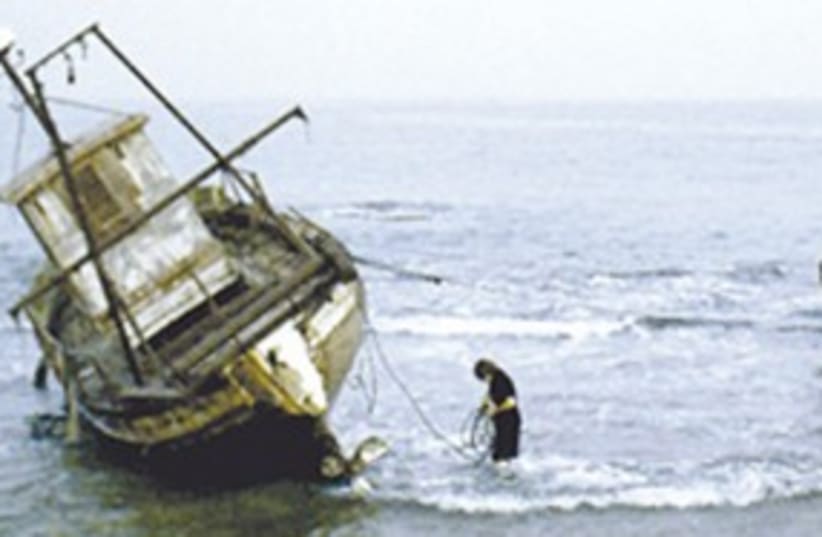Written and directed by Assaf Tager 90 minutes.
Hebrew title: Andante.
In Hebrew, check with theaters for subtitle information.Anyone who suffers through the mind-numbing boredom of seeing Assaf Tager’s pretentious allegory Andante has time to reflect on the experience. One hundred minutes, to be precise, during which not a second of the film will move or engross you. At the very beginning, an image of a couple entwined on satin sheets on a sinking boat is lovely and so carefully done that it seems to promise a decent film. After that, well, it’s all downhill, as the gifted actress Sarah Adler is wasted as a woman who still dreams in a dark, industrial, post-apocalyptic nightmare world where everyone else goes sleepless, except for a man named Mr. Coma. His dreams are broadcast for a dream-starved world, and then . . . Never mind.To search for and describe a coherent storyline in a film that aspires to trippy significance is pointless.But as I sat there and watched with envy as perhaps two-thirds of the audience walked out long before the ending, I thought of one of the most prescient and endlessly relevant quotations I have ever read. French poet Paul Valery, who died more than 65 years ago, quipped: “Everything changes but the avant-garde.”Darkness, muted color, pale faces in close-up, repetition of pseudo-profound phrases, lack of a plot, politically correct ideas (a corporation controls the last remaining dreamers) – all of this was old hat long before anyone reading this review was born.While I don’t doubt that all those, like Tager, who employ these techniques have deep feelings they would like to express, they use hackneyed, familiar images and words to portray their anger at the sterility of modern life and/or whatever else they are trying to say. Viewers who are bored or baffled by films like this are sometimes accused by directors of being shallow or philistine. But they’re just being honest.I have sat through more “avant-garde” works than most people due to my job. But other than Salvador Dali and Luis Bunuel’s short film Un Chien Andalou in 1929 or Chris Marker’s 1962 film La Jetee (which was the inspiration for Terry Gilliam’s screenplay for Twelve Monkeys), I haven’t seen anything that could be called “avant-garde” that had a shred of originality, let alone interest.To cite another quote, Joan Didion once wrote that no less than Ingmar Bergman and Federico Fellini “share a stunning visual intelligence and a numbingly banal view of human experience.”While I think she may have been a bit harsh on the two directors she names, this formulation is particularly useful when considering mega-pretentious films such as Andante. Yes, the production design is meticulous and quite well done, but it isn’t a painting, it’s a movie. The music is the single most memorable element, which isn’t surprising, since Tager is a musician in his day job.It’s a shame that Sarah Adler got stuck in this. Fortunately, she can be seen later this summer in a far more interesting role in the awardwinning Restoration (which will be shown at the Toronto Film Festival in September). This Israeli-French actress has appeared in Etgar Keret’s Jellyfish and Joseph Pitchhadze’s Year Zero, as well as Jean-Luc Godard’s Notre Musique and Sofia Coppola’s Marie Antoinette, and I always look forward to seeing her on screen. If anyone could possibly have made Andante work, it’s Adler. In Andante, Adler resembles Holly Golightly in Breakfast at Tiffany’s in that speaks her lines with conviction, or as Holly’s agent says, “She’s a real phony. She honestly believes all this phony junk she believes in.”Anyone who can make it appear that they believe in all this phony junk has a true gift. So keep an eye out for Restoration and for any other films Adler appears in.
